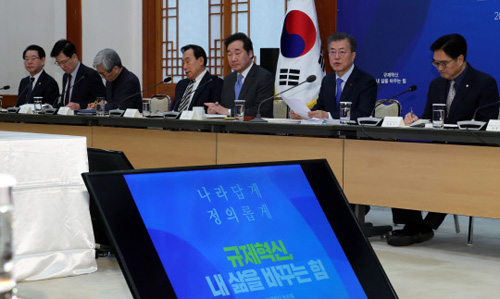New Technology & new business regulation to be changed after pre-operation…Specification of ‘regulation send-box’
Kang Eun Seong | esther@ | 2018-01-23 10:10:14

President Moon Jae-in expressed his greetings at the Blue House meeting on the morning of January 22, on the theme of 'Regulatory Innovation and the Power to Change My Life'. By Yonhap News
Overall ‘negative regulation’ introduction to be introduced
[Digital Times, Kang Eun-seong] `Negative` regulations have been introduced into new industries such as artificial intelligence (AI), big data, and autonomous driving, and science and technology and information and communication (ICT).
On January 22, `Regulatory Innovation Debate`, which President Moon Jae-in directly held, decided to introduce negative regulation on new industries such as agriculture and ICT.
The Korean law basically consists of `positive regulations`.
It can make various permits and licenses according to laws and regulations, or you can only specify things that are permitted by law, and if you do things that are not specified, it is a violation of law. Previously, when the industry was generally simple and the changes were not large, the law was not problematic.
Meanwhile, in a period of rapid change like the fourth industrial revolution era, such positive regulations are hard to follow. It takes a few months, a few years, to create or revise the law.
In the case of `Toss`, which was launched in 2014 and is leading the domestic remittance and convenience payment market, it was actually `illegal service` at the time of birth of the service. Domestic financial laws are adopting a "positive" approach that requires authorities to provide services only in accordance with the authorizations or specified rules, because the services provided by Toss are not listed in any of the domestic financial laws. Just because the old banking law did not just list services like Toss, Toss was almost an illegal service.
Lee Seung-gon, president of Fin Tech Korea, said, "If you ask me if I can do an innovation project like Pin Tech in Korea, I will answer that it is impossible." "There are already large entry barriers due to positive regulations, "Most of the start-ups (venture companies) are forced to give up their business because they are illegally treated because they are not in the law."
AI and Big Data-based industries, which are currently spreading rapidly, are all services that do not exist in `law`. It is possible to use the yoke of `illegal`. Therefore, the government plans to convert the legal system into a `negative` (comprehensive) approach.
On the other hand, negative regulation is a contrary concept to the current positive regulation, which permits only the methods prescribed by law.
The only thing that should not be done is the law, and the rest are allowed in principle. New technologies and new industries will be allowed to autonomy in principle without any prior regulation, and will be converted into post regulation. The government decided to apply the negative regulation first through 38 improvement tasks in total.
It has also embarked on the introduction of a `regulated sandbox` that will apply pre-regulation to post-regulation.
For now, the four laws will be revised, including the Information and Communications Convergence Act, the Financial Innovation Support Act, the Industrial Convergence Promotion Act, and the Regional Special Waste Law, and a legal basis for the introduction of a negative regulatory switch and regulatory sandbox will be created.
Negative regulation is also a safeguard against strong post-regulation and `infinite liability` for companies. Positive regulation is a pre-regulation, and once the license is granted by the government, it is guaranteed a substantial profit once it is approved. Even if the problem is blown up, there is a blind spot to receive indulgences if you keep the rules in advance, just as the law says.
A typical field is personal information protection. All three cards that leaked 114 million personal information and KT that has leaked 12 million subscribers` information are all authorized and approved by the government. In case of information leak, Or compliance with the privacy regulations stipulated by the law. Although the law on information protection has been revised several times since then, accidents are constantly occurring because of the more sophisticated methods of hackers or criminal organizations that try to extract information than those who keep the revised laws. In the end, it is not only easy to solve the law but also it is difficult to prevent it and it is not easy to ask for responsibility.
Once the introduction of negative regulations, it is a specialist`s diagnosis that the company may be subject to unlimited liability through strong post-regulation by principle.
Kim Kyung-hwan, a lawyer attorney at the law firm, said, "Currently, corporate social responsibility such as protection of users is specified by law. Observance of legal obligations is a structure to receive indulgences for other accidents or losses." For example, If the company stipulates comprehensive liability according to the negative regulation, the judiciary will judge the company`s `best` and will be able to take more responsibility and protect the consumers. "
By Kang Eun Seong esther@
